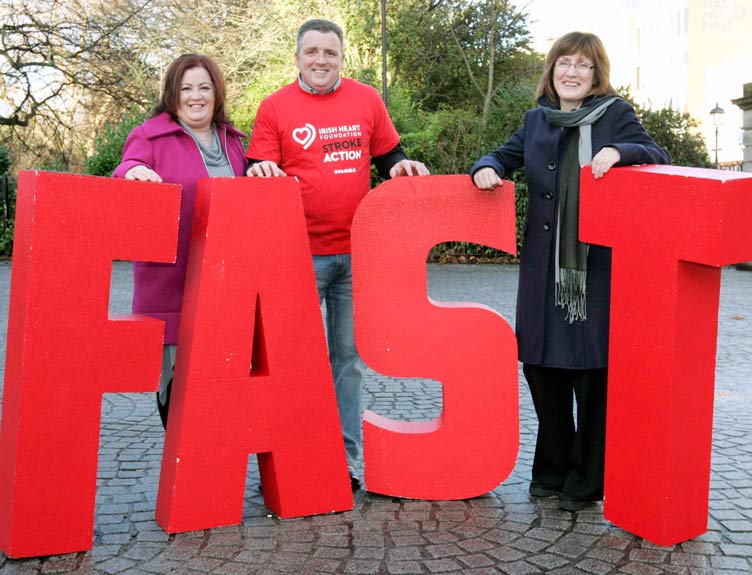RCSI study shows 87% increase in stroke-related admissions

Stroke-related hospital admissions increased by a staggering 87% following the launch of the Irish Heart Foundation's Act F.A.S.T. campaign to raise awareness of Ireland's third biggest killer disease, the findings of a study by RCSI has shown.
The RCSI research also showed that 59% more stroke victims got to hospital in time to receive potentially life-saving thrombolysis treatment during the first phase of the campaign in 2010.
The results of the study, which was conducted in Beaumont Hospital and Connolly Hospital, were announced at the launch of the second phase of the campaign in Dublin, attended by patients who survived their stroke because of the swift treatment they received after seeing Act F.A.S.T. advertisements.
The F.A.S.T. acronym was developed to inform the public about the key symptoms of a stroke:
- Face - has their face fallen on one side? Can they smile?
- Arms - can they raise both arms and keep them there?
- Speech - is their speech slurred?
- Time - time to call 999 if you see any one of these signs.
Head of the RCSI's Department of Psychology, Anne Hickey said that there was an 87.5% increase in hospital admissions among patients with facial droop, a 68% increase in those with weakness on one side and a 66% increase in cases of slurred speech during the campaign. Whilst presentations to A&E of suspected strokes identified by slurred speech remained high post campaign, the others returned to near baseline in the aftermath.
She added that the research would continue until March, providing a full 12 months of data collection which will provide a clearer picture of the lasting impact of the campaign.
"These results are extraordinary and show the significant impact the F.A.S.T. message is having in saving the lives of stroke victims and sparing many more from disabilities so severe that they would spend the rest of their lives in institutionalised care," said Irish Heart Foundation Head of Advocacy, Chris Macey.
"Ten thousand people will have a stroke in Ireland this year. These statistics demonstrate the profound influence patients can have on their own outcome or that of a loved one after stroke just by knowing the warning signs and the necessity to call an ambulance immediately following an attack."
Thirty-seven year-old Gary Smith, from Enniscorthy in Co Wexford, who had a stroke last July on his way to play golf told the launch: "I now know that if it wasn't for my wife's fast reactions calling 999 that I might not be here talking to you all today. Our story is proof that the Irish Heart Foundation's F.A.S.T. TV ad really does help save lives."
In addition to TV and radio advertisements, along with poster and leaflet campaigns across the hospital network, chemists and GPs surgeries nationwide, the Irish Heart Foundation supported local awareness raising efforts in 60 towns and cities following the Act F.A.S.T. launch last May.
However, despite the encouraging start to the four-year campaign, Mr Macey said the large spikes in awareness were so far not being maintained in the aftermath of the various activities, particularly TV advertising. "Awareness levels are dropping at the end of each wave of advertising, which underlines the need for more State support to ensure the message becomes more ingrained in the public consciousness. There is a lot of practical non-financial assistance they could give to help us develop long lasting awareness, such as putting F.A.S.T. training on to the school curriculum, putting F.A.S.T. messages on ambulances and where appropriate in high footfall areas of State-owned buildings and properties."
"This isn't too much to ask given that campaign is saving lives and is saving the State money by reducing the need for nursing home places for stroke patients. However, in spending €250,000 on the first phase of the campaign, we have had to hand over more than €50,000 to the Exchequer in VAT payments."
He added that research showed that the campaign had resulted in a 55% increase in stroke-related ambulance calls - almost identical to the UK which had spent £10 million last year on F.A.S.T. awareness raising.
Before the launch of the Act F.A.S.T. campaign, the Irish Heart Foundation also carried out a Red C poll which showed that just 45% of respondents would ring an ambulance immediately in the event of suffering a stroke and that over two-thirds of the adult population couldn't name more than one stroke warning sign. This study will be repeated in February to get a national picture of changes in stroke symptom awareness.



